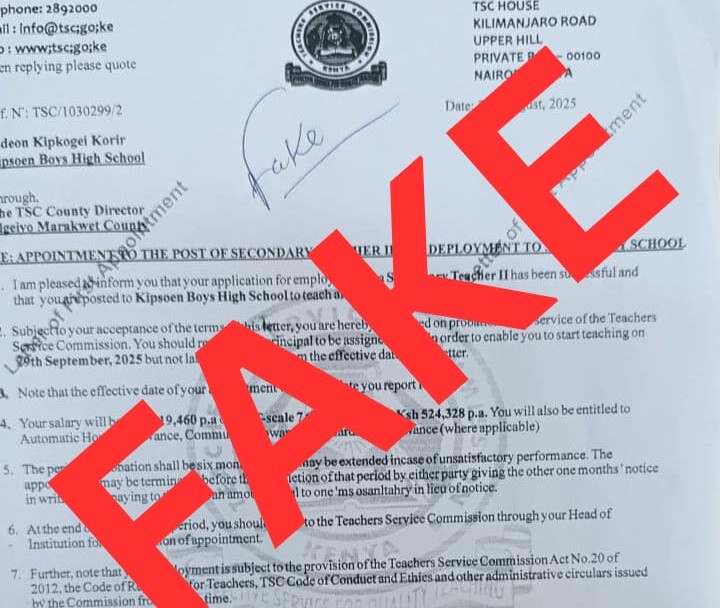
 Fake TSC teacher appointment letter. /TSC
Fake TSC teacher appointment letter. /TSC
The Teachers Service Commission has cautioned the public to be wary of fake appointment letters, dismissing one such document circulating online purporting to offer first employment to a teacher at a school in Elgeyo Marakwet county.
The letter, which bore the TSC logo and official format, falsely claimed to confirm the appointment of a secondary school teacher and outlined details of salary, allowances, and probation terms.
It was widely shared on social media, sparking a mix of confusion and excitement among jobseekers.
"When are you employing P1 teachers? I've stayed for over 11 years after graduation," one inquired, seemingly convinced that the letter was genuine.
In a swift response, the commission urged Kenyans to exercise vigilance and verify information through its official communication channels.
“Beware of a fake letter purporting to be from the TSC. Stay alert and confirm information from the official channels of the commission,” TSC said in a statement.
The commission stressed that all employment, transfers, and deployment communications are issued directly through its secure platforms, including its website and official county offices.
Any letters outside these formal channels, it added, should be treated as fraudulent attempts to mislead teachers and the public.
The circulation of the forged document comes at a time the government is mulling recruiting 24,000 new teachers by January as part of ongoing efforts to address shortage of teaching staff in schools across the country.
The additional tutors will help improve the student-teacher ratio and strengthen the roll-out of Competency-Based Education (CBE).
The planned recruitment is expected to bring the total number of teachers employed under President William Ruto’s administration to 100,000 since he took office in September 2022.
Architects of the fake recruitment letter could be taking advatange of this noble cause to target thousands of unemployed teachers, who are often desperate for opportunities in the profession.
Education officials say the sustained hiring drive is a key pillar of the government’s agenda to reform the sector and ease the burden on overworked teachers.
With the implementation of the CBE framework now at advanced stages, schools have been grappling with stretched resources, particularly at the junior secondary level.
Headteachers and parents have repeatedly voiced concerns about the high number of learners per teacher, noting that the shortage negatively affects classroom interaction and the quality of education.
The Ministry of Education has acknowledged the challenge, pointing to rapid enrolment growth and the ongoing transition of double cohorts as key pressure points.
The government has argued that hiring more teachers is the most effective way to resolve these gaps and ensure smooth curriculum delivery.
“Previous governments have been recruiting only 4,000 to 5,000 teachers. The government has employed 76,000 teachers and an additional 24,000 will be recruited by December. The target will be achieved by 2027,” Deputy President Kithure Kindiki said during a recent visit to Kilome constituency.
Education stakeholders argue that a larger teaching workforce is essential not only for academic outcomes but also for mentoring and supporting the holistic development of children under the new competency-based approach.
Meanwhile, the TSC has urged teachers and the general public to remain alert to fraudsters exploiting the recruitment drive to spread fake information.
The commission has previously maintained that successful applicants will receive formal communication through its official channels and warned against paying bribes or entertaining shortcuts in the hiring process.
Misinformation remains a potent threat in the digital era, with false documents and social media posts spreading rapidly before authorities can intervene.


![[PHOTOS] China holds massive parade to mark 80th anniversary of WWII](/_next/image?url=https%3A%2F%2Fcdn.radioafrica.digital%2Fimage%2F2025%2F09%2Fbd5dfa7a-3a06-486e-b6b0-6b032c0ffc73.jpg&w=3840&q=100)








